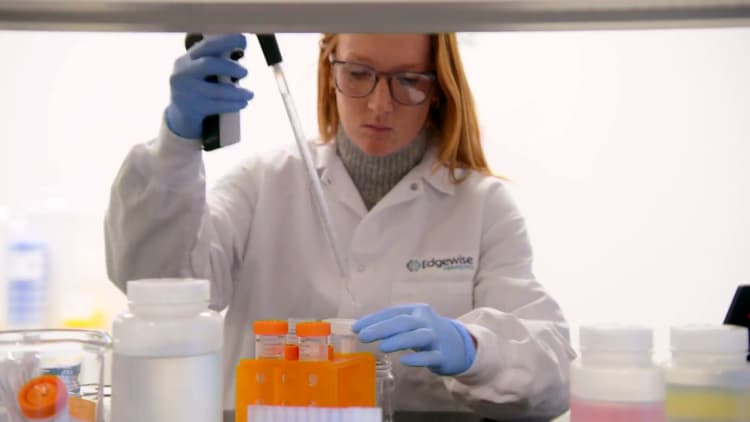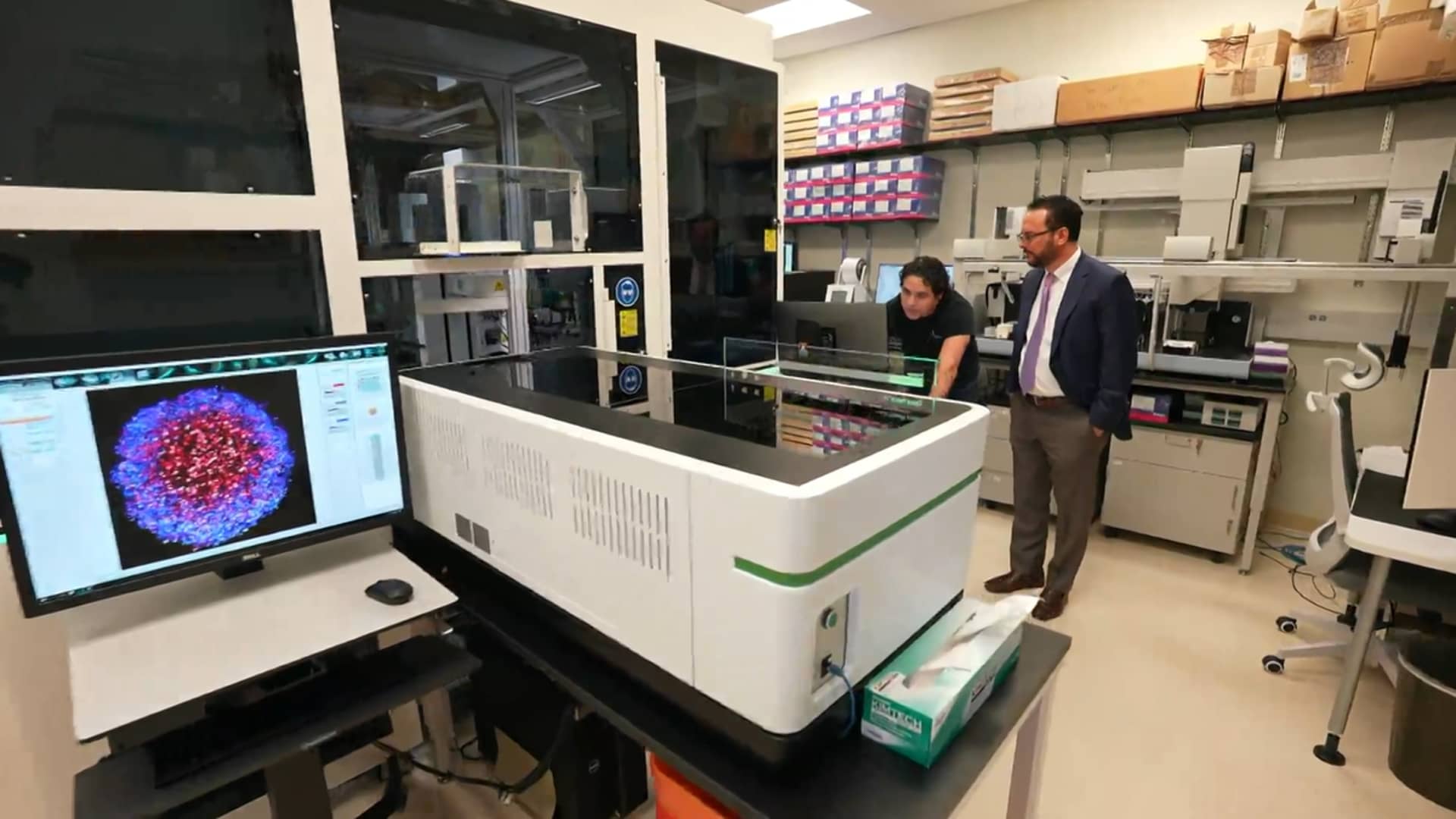
This story is part of CNBC’s quarterly Cities of Success series, which explores cities that have transformed into business hubs with an entrepreneurial spirit that has attracted capital, companies and employees.
The Denver-Boulder region is rapidly emerging as a major hub for the life sciences industry, attracting companies that develop cutting-edge medical treatments and technologies.
Life sciences research aims to understand living things, from cells to our planet, to improve health, food and the environment. The funding growth is being fueled by a combination of factors: a surge in venture capital and government funding, a collaborative research environment and a booming market for lab space.
BioMed Realty CEO Tim Schoen gives CNBC a tour inside a construction site slated for conversion into state-of-the-art lab space.
CNBC
San Diego-based BioMed Realty, a major real estate player (acquired by Blackstone in 2016 for $8 billion), made headlines in 2022 with a record-breaking $625 million purchase of Flatiron Park, a massive complex in Boulder, Colorado. The 1 million square feet across 23 buildings is being converted into lab and tech space to meet the region’s surging demand.
“This was a logical next step … to invest in Boulder and scale,” said Tim Schoen, BioMed Realty’s president and CEO. “Boulder has all the elements you want in an innovation ecosystem — research universities, scientists, venture capital, and then ourselves who provide the mission-critical infrastructure.”
In addition to Boulder, the firm operates in five other core life science and tech markets including San Diego, San Francisco, Seattle, the Boston and Cambridge area in Massachusetts, and Cambridge, U.K.
Enveda Biosciences, a biotechnology company, occupies lab space in Boulder.
CNBC
According to commercial real estate group CBRE, 14 companies were seeking a cumulative 506,000 square feet of lab space across the Denver-Boulder market in 2023, which includes the neighboring city of Aurora. In addition, the Denver-Boulder market saw 370,000 square feet of lab space completed and move-in ready with another 560,000 square feet under construction or renovation.
“I would describe Boulder as unique and explosive. Unique from the standpoint of its setting at the foothills of the Rocky Mountains,” said Schoen, “and then explosive in terms of how the ecosystem has really grown and expanded over the last decade.”
Funding on the rise
Investors are taking notice.
“Investors from Colorado as well as across the coasts are seeing opportunities here,” said Elyse Blazevich, president and CEO of the Colorado Bioscience Association. “Our ecosystem has raised in excess of a billion dollars for the past seven consecutive years — and early stage funding in Colorado in 2023 grew faster than other life sciences markets around the country.”
Founded in 2003, the Bioscience Association supports the growth of life sciences, with a focus on access to capital, education, networking and more.
According to Blazevich, funding for pre-seed ventures, series A and series B rounds increased from 2022 to 2023. The biggest increase was seen in series A and series B funding, which grew by $53 million, or 28%, year over year. Pre-seed funding, the earliest stage of venture capital, grew by $18 million, surging 163%, over that time period.
A recent CBRE report found Denver-Boulder to be the top U.S. life sciences real estate market, fueled by record investment from venture capitalists and the National Institutes of Health.
The report also found the pool of qualified workers in life sciences is growing much faster in the region than the national average, growing 35% over the past five years, compared to 16% growth for the U.S. overall.
Entrepreneurial success
The recent surge in venture capital flowing into Denver-Boulder builds on the area’s proven track record of success over the past several decades.
In 1998, entrepreneur Kevin Koch co-founded biotech company Array BioPharma in Boulder. The company was acquired by Pfizer for $10.64 billion in 2019, and now Koch is co-founder and CEO of clinical-stage startup Edgewise Therapeutics.
Edgewise develops therapies for rare muscle disorders and generated net proceeds of $186.1 million in its initial public offering in March 2021.
But the company started small.
“We were in an incubator within the University of Colorado. And we brought in talented folks from the University of Colorado,” Koch told CNBC. “We had interns come in, who ultimately became employees.”
A scientist at work at Edgewise Therapeutics in Boulder, Colorado, focused on developing therapies for rare muscle disorders.
CNBC
Today, Edgewise has a much bigger space in Boulder: 28,000 square feet in total, with half of its 93 employees working in the city office. The company plans to expand its footprint and to hire more workers in the coming years.
Koch said the Boulder region’s history of research into DNA and RNA in the 1980s was key to unlocking protein-based medicines to battle disease, which helped to attract capital to the life science hub.
“[That research] nucleated investment in the Boulder area,” he said. “Now, those companies that commercialized those products, they reinvested in Boulder.”
With the help of top venture firms, Edgewise Therapeutics has raised more than half a billion dollars — $550 million in cash runway through 2027.
“We decided that Boulder really was the right place. And I think it turns out that that was the case. We’ve been able to attract a lot of fantastic talent,” Koch said.
Research powerhouse
Denver-Boulder’s innovation ecosystem is churning out ideas, fast.
Aurora, Denver’s biggest suburb, is the epicenter of life sciences research: a 256-acre complex that’s home to the University of Colorado’s Anschutz Medical Campus, which receives $700 million in annual grant funding.
Dan LaBarbera is professor of pharmaceutical sciences and founding director of the medical campus’s Center for Drug Discovery.
“Our goal here at the Center for Drug Discovery is to function as a bridge to move innovation from academia, to industry, and then to the clinic,” LaBarbera told CNBC.
A glimpse inside the Center for Drug Discovery at CU Anschutz Medical Campus, led by Dr. Dan LaBarbera (right), with the aim of accelerating the process from drug discovery to delivery for patients.
CNBC
Founded in 2021, the center develops drugs for a wide range of diseases from cancer to Alzheimer’s — using state-of-the-art technology including robots and 3D bioprinters.
“I think people in general are familiar with 3D printers, in their ability to print plastics, or even metals,” LaBarbera said. “We’re using very similar technologies to print complex tissues that mimic aspects of human disease.”
Historically, it took roughly 10 to 15 years for a drug to move from discovery phase to approval from the U.S. Food and Drug Administration.
“Now we can expedite that with this technology to make that process roughly six to eight years,” LaBarbera said.
The center helps shorten the timeline from drug discovery to treatment, aiding startups and existing companies to get breakthrough medications to patients faster.
“Our goal is not to compete with the pharmaceutical industry,” said LaBarbera. “Our goal is actually to work with them to develop really innovative potential drug therapies.”
TUNE IN: The “Cities of Success” special featuring Denver & Boulder will air on CNBC on April 11 at 10 p.m. ET.

